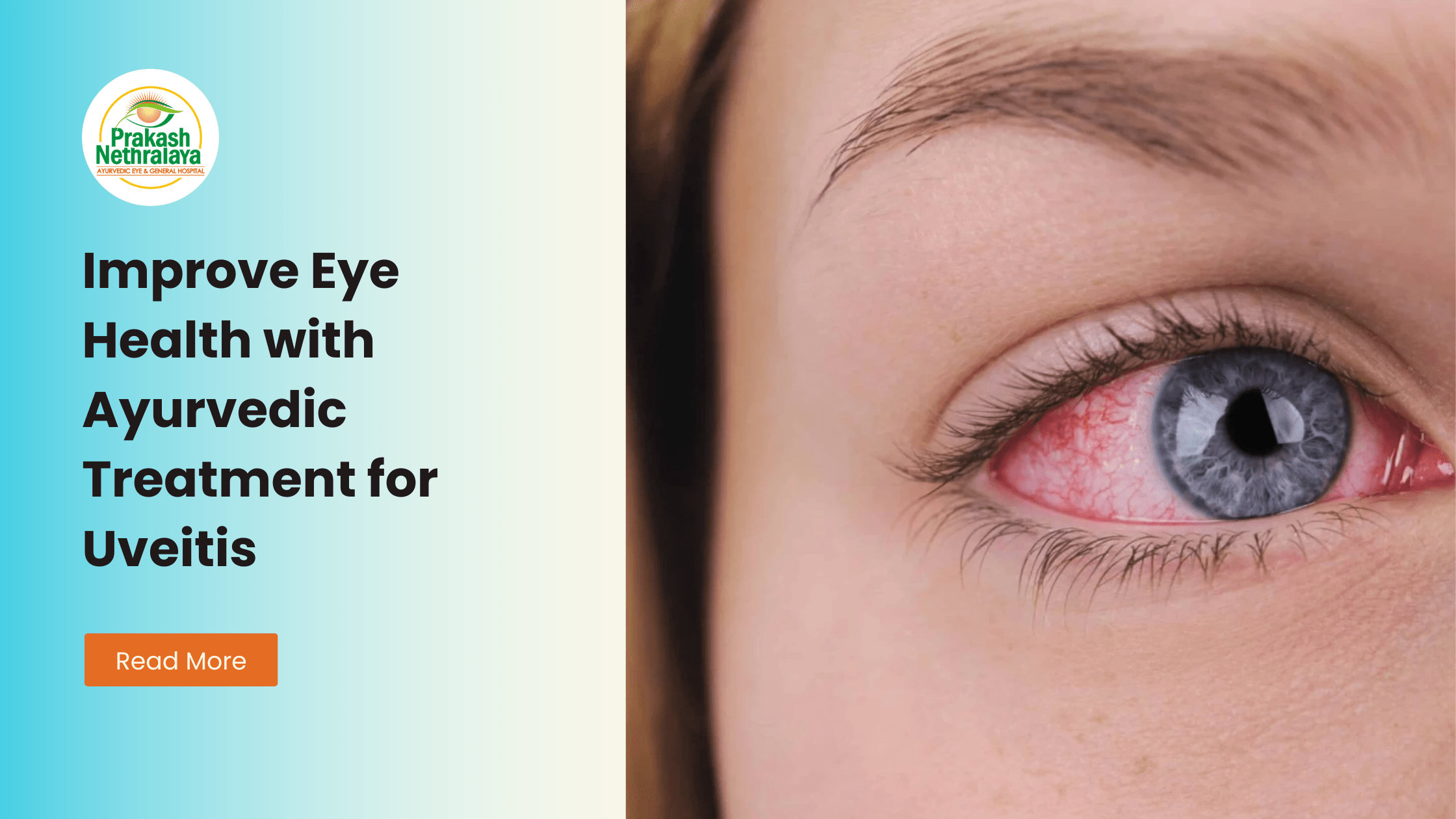Uveitis, the inflammation of the uveal tract of the eye, can lead to severe vision complications if not managed properly. This condition can be acute or chronic and may affect one or both eyes. Ayurveda is a natural system of healing that has been around in India for almost centuries today. It emphasizes the significance of diet and lifestyle in managing uveitis effectively. This blog explores how dietary choices and lifestyle modifications can play a crucial role in uveitis treatment in ayurveda
1. What is Uveitis?
Uveitis is an inflammatory condition affecting the uveal tract, which includes the iris, ciliary body, and choroid.
- Types of Uveitis: Anterior (iris), intermediate (ciliary body), posterior (choroid), and panuveitis (all parts).
- Symptoms: Redness, pain, photophobia, blurred vision, floaters.
- Ayurvedic Perspective: Imbalances in doshas—particularly Pitta—are often implicated.
2. How Does Diet Influence Uveitis?
Diet plays a pivotal role in Ayurvedic treatment by balancing doshas and reducing inflammation.
- Anti-inflammatory foods: Include turmeric, ginger, garlic, and leafy greens.
- Hydration: Drink adequate water; herbal teas like chamomile can be beneficial.
- Avoidance of irritants: Minimize spicy or acidic foods; opt for cooling foods like cucumbers.
- Balanced meals: Whole grains, legumes, fruits, and vegetables support overall health.
3. What Lifestyle Changes Are Recommended?
Lifestyle modifications are essential for managing uveitis effectively.
- Stress management: Incorporate yoga and meditation to reduce stress.
- Sleep hygiene: Aim for 7-8 hours of quality sleep each night.
- Regular exercise: Moderate activities like walking or swimming enhance circulation.
- Digital detox: Reduce screen time to alleviate eye strain.
4. Why is Panchakarma Important?
Panchakarma therapies are integral to the Ayurvedic treatment of Uveitis.
- Detoxification: Eliminates toxins (ama) contributing to inflammation.
- Personalized treatments: Tailored to individual doshic imbalances.
- Long-term benefits: Prevents recurrence of symptoms through regular detoxification.
- Common treatments: Virechana (purging), Basti (medicated enema), Nasya (nasal administration).
5. How Can Herbal Remedies Support Treatment?
Herbal remedies are a cornerstone of Ayurvedic management for uveitis.
- Turmeric (Haridra): Anti-inflammatory properties due to curcumin.
- Neem (Azadirachta indica): Antimicrobial benefits for managing infections.
- Triphala: Supports digestion and detoxification; balances doshas.
- Ginkgo Biloba: Improves blood circulation and protects against oxidative stress.
6. What Role Does Immune Function Play?
A robust immune system is crucial in managing uveitis effectively.
- Balanced diet: Nutrient-rich foods enhance immune response.
- Herbal support: Adaptogens like Ashwagandha help modulate immune function.
- Avoiding triggers: Identify allergens to prevent immune overreactions.
- Probiotics: Fermented foods support gut health linked to immunity.
7. How Can Eye Care Practices Help?
Proper eye care practices are vital in managing uveitis symptoms.
- Sun protection: Wear sunglasses to reduce light sensitivity.
- Regular check-ups: Frequent visits ensure timely treatment adjustments.
- Eye exercises: Palming improves circulation; gentle exercises reduce strain.
- Warm compresses: Soothe discomfort associated with inflammation.
8. What is the Overall Approach to Managing Uveitis?
The Ayurvedic approach to managing uveitis is comprehensive and multifaceted.
- Holistic treatment plans: Combine diet, lifestyle changes, herbal remedies, and Panchakarma therapies.
- Patient education: Knowledge empowers better adherence to treatments.
- Long-term commitment: Sustained lifestyle changes prevent recurrence and promote overall health.
9. The Role of Mindfulness in Uveitis Management
Mindfulness practices can significantly impact overall well-being and eye health.
- Meditation techniques: Focus on breath awareness or guided imagery to reduce stress.
- Mindful eating: Pay attention to food choices; savor each bite to enhance digestion.
- Emotional balance: Recognize emotional triggers that may exacerbate symptoms.
10. The Importance of Community Support
Engaging with a supportive community can enhance recovery from uveitis.
- Support groups: Sharing experiences with others can provide emotional relief.
- Family involvement: Educating family members about your condition fosters understanding and support.
- Workshops and seminars: Participate in educational events focused on Ayurvedic practices for eye health.
11. Seasonal Considerations in Diet
Adjusting your diet according to seasonal changes can help manage uveitis effectively.
- Summer months: Focus on cooling foods such as melons, cucumbers, and coconut water to balance Pitta dosha.
- Winter months: Incorporate warming spices like cinnamon and nutmeg while consuming hearty soups and stews for nourishment.
12. The Impact of Environmental Factors
Environmental factors can influence uveitis flare-ups; awareness is key.
- Air quality: Polluted environments may aggravate symptoms; consider air purifiers indoors.
- Allergens: Monitor pollen counts during allergy seasons; stay indoors when levels are high.
13. The Role of Regular Monitoring
Regular monitoring of eye health is crucial in managing uveitis effectively.
- Scheduled check-ups: Frequent evaluations by an eye specialist help track disease progression.
- Symptom diary: Keeping a record of symptoms can help identify triggers or patterns related to diet or lifestyle changes.
14. Integrating Conventional Treatments with Ayurveda
Combining conventional medicine with Ayurvedic practices can enhance treatment outcomes for uveitis patients.
- Collaboration with healthcare providers: Work closely with ophthalmologists when integrating Ayurvedic remedies into your treatment plan.
15. Personalizing Your Treatment Plan
A personalized approach is essential for effective management of uveitis through Ayurveda.
- Consultation with an Ayurvedic practitioner: A thorough assessment will identify individual doshic imbalances and tailor treatments accordingly.
16. The Importance of Nutritional Supplements
In addition to dietary changes, nutritional supplements can play a supportive role in managing uveitis within Ayurveda’s framework.
- Herbal supplements: Consider formulations like Triphala or Amla that are rich in antioxidants and support eye health.
17. Understanding the Role of Detoxification
Detoxification is fundamental in Ayurveda for treating conditions like uveitis.
- Elimination of toxins: Regular detox helps clear ama (toxins) from the body that may exacerbate inflammation.
18. The Significance of Restorative Practices
Restorative practices contribute significantly to healing processes in Ayurveda.
- Adequate rest: Prioritize sleep as it aids recovery from inflammation and supports overall health.
19. The Role of Eye-Specific Herbal Formulations
Ayurveda utilizes specific herbal formulations designed for eye health that can be beneficial for managing uveitis symptoms.
- Netradhara: A therapy involving medicated oils poured over the eyes that enhances circulation and reduces inflammation specifically related to Pitta dosha disorders like uveitis.
20. The Role of Ayurvedic Eye Treatments
Ayurvedic eye treatments specifically designed for uveitis can provide targeted relief.
- Tharpanam: A treatment where medicated ghee is retained around the eyes to nourish and soothe the ocular tissues.
- Netrabasti: A procedure that involves creating a small reservoir of warm medicated oil around the eyes, promoting healing and reducing inflammation.
21. The Importance of Emotional Well-being
Emotional health plays a significant role in managing physical conditions like uveitis.
- Stress reduction techniques: Practices such as yoga and meditation can help manage emotional stress, which may trigger or worsen uveitis symptoms.
- Positive mindset: Cultivating a positive outlook through affirmations for gratitude practices can enhance overall well-being and support healing.
Conclusion
To sum it up, uveitis treatment in Ayurveda requires a holistic approach that emphasizes diet and lifestyle changes alongside traditional treatments. By focusing on anti-inflammatory foods, stress management techniques, herbal remedies, proper eye care practices, mindfulness, community support, seasonal adjustments, environmental awareness, regular monitoring, personalized plans, nutritional supplements, detoxification strategies, restorative practices, and eye-specific herbal formulations, individuals can significantly improve their condition and reduce the risk of recurrence. At Prakash Nethralaya our commitment to these principles not only aids in managing uveitis but also promotes overall well-being and enhances quality of life. Our procedures are completely natural and give you long-term results keeping you off the medication that might have certain side effects on the body. So don’t wait any longer!
Book an online appointment for a consultation with us.




